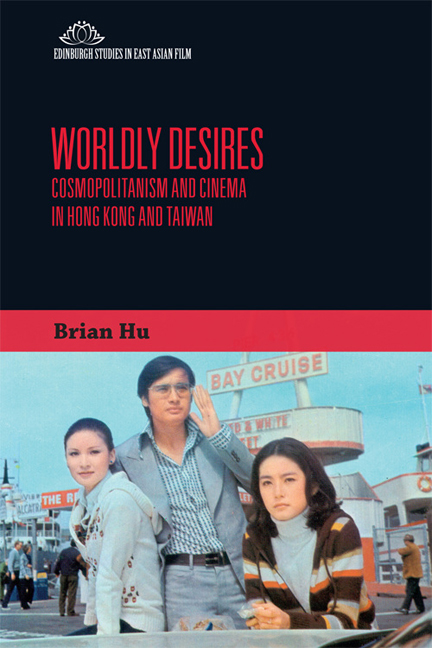Book contents
- Frontmatter
- Contents
- List of Figures and Tables
- Acknowledgments
- Notes on Romanization
- Introduction
- 1 Melodramas of Arrival and Departure: Jet-set Students in 1970s Taiwanese Romance
- 2 ABCs, Mixed-race Stars, and Other Monsters of Globalization
- 3 Setting the Stage: Hong Kong Musical Stars Take on the World
- 4 All the Right Moves: Mobile Heroes and the Shaolin Temple Film
- 5 The Cosmopolitan Brand: Film Policy as Cultural Work in the International Film Market
- Conclusion
- Works Cited
- Index
1 - Melodramas of Arrival and Departure: Jet-set Students in 1970s Taiwanese Romance
Published online by Cambridge University Press: 04 May 2021
- Frontmatter
- Contents
- List of Figures and Tables
- Acknowledgments
- Notes on Romanization
- Introduction
- 1 Melodramas of Arrival and Departure: Jet-set Students in 1970s Taiwanese Romance
- 2 ABCs, Mixed-race Stars, and Other Monsters of Globalization
- 3 Setting the Stage: Hong Kong Musical Stars Take on the World
- 4 All the Right Moves: Mobile Heroes and the Shaolin Temple Film
- 5 The Cosmopolitan Brand: Film Policy as Cultural Work in the International Film Market
- Conclusion
- Works Cited
- Index
Summary
Why do so many postwar Taiwanese and Hong Kong films begin and end in airports? The pattern is not unique to any single genre. To name only a few, there is the family melodrama Her Tender Heart (Tang Huang, 1959) about a mother living in Italy who returns to Hong Kong to visit her estranged daughter, the backstage musical The Lark (Hsieh Chun, 1964) about a chanteuse who travels Southeast Asia entertaining her fans, the spy film Black Falcon (Takami Furukawa, 1967) about an exotic globetrotter who gets mixed up in an international crime ring, and the comedy of ethics Home Sweet Home (Pai Ching-jui, 1970) about overseas students visiting family in Taipei. In many ways, beginning or ending a film with the arrival or departure of key figures exemplifies Tzvetan Todorov's “grammar of narrative,” where a state of equilibrium is broken and various machinations are required to restore the disequilibrium back to a state of equilibrium. In fact, there is an entire tradition of narratives of arrival and departure in literature (such as Uncle Vanya) and film (On the Town). In Chinese narrative, arrival and departure is often structured into the expectation of the datuanyuan (or “big reunion”), which implies a circular pattern of conflict and resolution, whereby stories end through a cosmologically driven return to an original state. Examples would include the revenge story and the story of family togetherness. Daoist philosophy privileges this circular pattern of experience, whereby fulfillment is achieved not by adventuring into the outside world, but by self-reflexively turning back to the point of origin. Not surprisingly then, the airport has become an especially dramatic setting for such narratives, from Hollywood to Hong Kong. With its impending boarding times and disappearance into the heavens, the airport departure connotes a finality that elicits tears, elation, and anticipation in the characters and the audience, as well as setting the scene for such clichés as the last-minute airport chase where men sprint past security guards and checkpoints to profess their love before it's too late. The return is a transcendence of that distressing finality with a harmonious one: reunion, resurrection, redemption.
- Type
- Chapter
- Information
- Worldly DesiresCosmopolitanism and Cinema in Hong Kong and Taiwan, pp. 19 - 62Publisher: Edinburgh University PressPrint publication year: 2018



